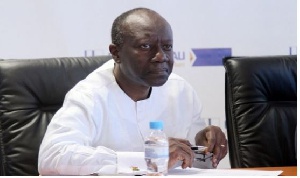Business News of Monday, 25 June 2018
Source: www.ghanaweb.com
Review mid-year budget to restore cedi – GN Research
GN Research is calling on government to employ pragmatic measures in stabilizing the Ghana cedis to prevent it from depreciating further in order to boost economic activities in the country.
The investment research firm said, though the local currency is performing better at the time than it did in 2016, there is still the need to preserve it as “it can be said that the value of the cedi provides backing for most macro variables and not the other way round. This is why a stable cedi is very crucial to the sustainable growth of the economy”.
The GN Research in a statement signed by its General Manager, Samuel Kofi Ampah wants the Finance Minister to review the mid-year budget to grow certain sectors of the economy identified by the firm as practical in stabilising the cedi.
According to the statement, “Given the importance of exchange rate stability to the economy, the perennial depreciation of the cedi should be brought to an end. This, however, requires political will to implement policies which aim at stabilizing the cedi in the medium to long-term relative to short-term measures. GN Research’s long-held view is that the economy of Ghana is dependent on foreign production. Therefore, little can be done in managing the demand situation in the forex market. This means that the more practical way is to increase supply through sustainable means.”
The country’s tourism industry must see a major facelift with regards to public awareness creation on the tourist sites in the country in order to increase patronage.
The GN Research is also urging government to, among other things cut down on import and invest more into agriculture so as to increase domestic production and boost non-traditional exports.
“Agriculture remains the bedrock of the Ghanaian economy and more investment is required to produce more food and reduce the huge import bill on agriculture products. This should decrease the demand pressure on the Cedi. Aside investing in agriculture to reduce food importation, focus on nontraditional exports like yam, banana, pineapple, among others should yield more foreign exchange for the country. This should provide a sustainable source of inflows of foreign exchange to support the local currency,” the statement further reads.
Read full statement below
___________________________________________________________________________
PRESS RELEASE
TO NEWS EDITOR
Mid-year budget review to restore Cedi
The several external factors especially with the rise in crude oil prices, the US Treasury rates adjustment has set off a domino effect impacting on the Ghanaian cedi. There is increasing need to preserve the cedi and prevent it from plummeting even further especially when the government has made some progress with stabilizing the currency this year.
The cedi as we have it, is made to drive almost all the macroeconomic variables in the Ghanaian economy. Anytime the cedi is stabilized, economic variables such as inflation and interest rates among others tend to do well because the economy largely depends on external conditions. Therefore, it can be said that the value of the cedi provides backing for most macro variables and not the other way round. This is why a stable cedi is very crucial to the sustainable growth of the economy.
It should also be noted that notwithstanding the current rate of depreciation of the cedi, its performance so far this year is better compared to 2016 and 2017. By 20th June 2016, the Cedi had lost 2.83%, 2.86% and 6.88% of its value against the Dollar, the Pound and the Euro respective and 3.45%, 5.61% and 9.07% by 20th June 2017. As at 20th June 2018, the Cedi had depreciated by 1.11% against the Dollar but gained 1.32% and 2.38% against the Pound and the Euro respectively.
This improved performance is primarily because of inflows of foreign exchange from foreign investors as a result of growing interest in government’s longer dated debt instruments. The recent tax reforms such as the abolishment of VAT/NHIL on financial services, domestic airline fares and real estate sales among others have also improved the investment climate leading to more foreign exchange inflows.
Though the cedi benefited from these policies, more policies are required to maintain the value of the cedi. This is because, these investors, are seeking profit and are likely to transfer their investments to more profitable and less risky instruments as is happening now. For instance, the interest on the US short term Treasury bill reached nearly a decade high of 1.895% on 21st May 2018. Also, the yield on the US 10-year Treasury note has been on the rise, reaching 3% since 2011. Hence investors are disinvesting the Government of Ghana instruments for the US treasury bills and notes.
Given the importance of exchange rate stability to the economy, the perennial depreciation of the cedi should be brought to an end. This however, require political will to implement policies which aim at stabilizing the cedi in the medium to long term relative to short term measures. GN Research’s long held view is that, the economy of Ghana is dependent on foreign production. Therefore, little can be done in managing the demand situation in the Forex market. This means that, the more practicable way is to increase supply through sustainable means.
This should include tourism development, sufficient investment in agriculture especially, nontraditional exports, foreign direct investment and general increase in domestic production. The awareness regarding the importance of tourism sector to the development of the economy is weak. The tourist sites and facilities may be available, but their existence will yield no results if the public is unaware to patronize them. Hence there is the need to start a national tourism awareness campaign program. This should be done alongside the development of the necessary physical infrastructure to have a robust tourism sector.
Agriculture remains the bedrock of the Ghanaian economy and more investment is required to produce more food and reduce the huge import bill on agriculture products. This should decrease the demand pressure on the Cedi.
Aside investing in agriculture to reduce food importation, focus on nontraditional exports like yam, banana, pineapple, among others should yield more foreign exchange for the country. This should provide a sustainable source of inflows of foreign exchange to support the local currency.
Finally, since the exchange rate determines the direction of almost all the macro variables in Ghana, GN Research is calling on the government and the minister of finance to use the mid – year budget review to grow the aforementioned sectors of the economy because it is the most practicable way of ensuring the long-term stability of the cedi.
Signed
Samuel Kofi Ampah (General Manager)











